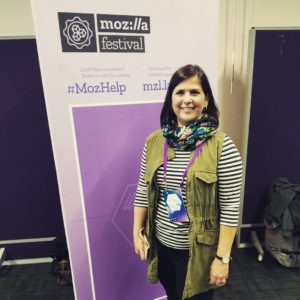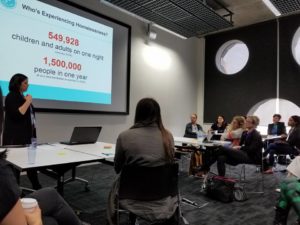Limited access to technology keeps homeless families down
While technology makes the world easier and more accessible for many people, for others, it just adds to their isolation.
“For homeless families, not having access to technology makes everything harder,” said Beth Vann-Turnbull, executive director at Housing Families First. “Apartment applications, utility applications, job applications, Social Services applications, bus schedules … everything has to be done online now. If you don’t have access to the Internet, you’re at even more of a disadvantage.”
Even children need to have easy access to the Internet and to computers now in order to do their homework.
Figuring out how to get technology into the hands of her clients is one of Vann-Turnbull’s missions.
Obstacles everywhere
Housing Families First offers temporary shelter – and then permanent housing — to families in the Richmond metro area. In most cases, Vann-Turnbull said, families just need a little extra help getting into an apartment.
Just getting into an apartment may only require a little extra money for security deposits and utility hookups, but it requires a lot of Internet, Vann-Turnbull explained.
Libraries offer free computers but getting to and from a library requires taking buses. Plus the library may limit the amount of time a user can be on the computer. For homeless parents juggling children and multiple jobs, it’s not a very feasible option. For homeless kids trying to keep up with daily homework that requires a computer, it’s even less feasible.
“Instead, they’re trying to fill out long applications on smartphones,” she said. “There are still websites and applications that aren’t made for smartphones, so that’s even harder. And they have very limited data so they’ve got to find wi-fi connections. Many children are trying to do homework on smartphones, too, but they don’t have enough data to do that.”
Getting by with a little help from a government phone
The cliche complaint about low-income people carrying expensive phones is a damaging misconception, Vann-Turnbull said. In some cases, smartphones are given to homeless and low-income families as part of the national Lifeline Program designed to help them get jobs, apartments, transportation and services.
“People see someone with a smartphone and think they must be paying a lot of money for it but they usually aren’t,” she said. “They’re part of a grant program. One gentleman refers to it as his ‘government phone.’ They offer free text and calling, but also restrictions on data use. You can’t keep in touch with your case manager, your family, or anyone else if you don’t have a phone.”
Unfortunately, proposed legislation threatens to substantially decrease the reach of, if not totally dismantle, the Lifeline Program. In the 21st century, Internet access and communication isn’t a luxury, it’s a necessity. The Internet used to be referred to as the information superhighway, but traveling on it is now such a requirement of everyday life, it’s become more like asphalt – taken for granted but an absolute necessity to get anywhere.
Opportunities everywhere
But while online everything makes a lot of tasks harder, it also makes a lot of tasks easier.
Vann-Turnbull recently traveled to London for Mozilla Festival, or”MozFest,” which describes itself as “the world’s leading festival for the open Internet movement.” The festival explores the intersection of the internet and civil society, journalism, public policy, and art, and it promotes and protects an open and health internet internationally. At MozFest, Vann-Turnbull got a chance to compare notes with IT professionals, artists, educators, and nonprofit professionals from around the world on how the Internet is creating obstacles – and opportunities – for their constituents and clients.

Beth Vann-Turnbull speaks at MozFest 2017 in London.
“One of the exciting things we’ve introduced clients to in the past is Google Street View,” she said. “They can use it to scope out the neighborhood where they might rent an apartment. It saves them from having to take a bus across town to see it.”
When a client hears that an apartment is available for rent, they can use the Internet to look at pictures and read a description, but pictures taken by a landlord don’t usually show the neighborhood. For people with no reliable transportation and no job flexibility, it’s a major undertaking to get across town to see an apartment. Or back and forth to see many apartments on different sides of town.
With Google Street View, the client can scan pictures of the entire block and neighborhood, panning around to look at the condition of buildings and cars, checking for graffiti or boarded up windows to see if the neighborhood looks safe and stable before they go through the effort of visiting in person.
“It saves them a lot of time and money but more than that, people just feel empowered,” Vann-Turnbull said.
Housing Families First staff relies on Google Voice to communicate with clients, and case managers can introduce families to the app, which offers free phone, text and voicemail service.
“All of this – Internet on the go, calling, texting, voicemail … it’s an imperative,” Vann-Turnbull said. “People can’t function in society without them.”
To further promote low-cost access to the internet, computers, and smart devices for its clients and other families across the country, Housing Families First recently joined the National Digital Inclusion Alliance. NDIA provides a unified voice for broadband access, personal devices and local technology training and support programs; it’s members include major libraries and universities, as well as local nonprofits like Housing Families First.

Vann-Turnbull speaks on digital inclusion at MozFest 2017.
Computer labs are still a thing
One of the other ways Housing Families First helps is by maintaining its own computer lab for clients. Adults can use the computers to fill out applications and look for jobs, while their children can use them for homework and research. Staying in touch with friends and family is also critically important, and the lab offers free internet access that makes it possible.
Housing Families First buys the computers at a discounted rate and partners with James Williams, long-time volunteer and owner of TekRVA, to arrange for setup and maintenance.
But computers don’t last forever and neither do the routers needed to keep the Internet flowing. Vann-Turnbull said the organization is always looking for monetary donations to keep the computer lab and other communications tools up-to-date.
The organization can’t take donations of old computers or equipment, she said, but money will help to ensure that everyone can get access to the information and services they need just to get back on their feet.
“This is the reality of the world we live in now,” Vann-Turnbull said. “Low-cost broadband, free web services and mobile connectivity are key to removing barriers.”



